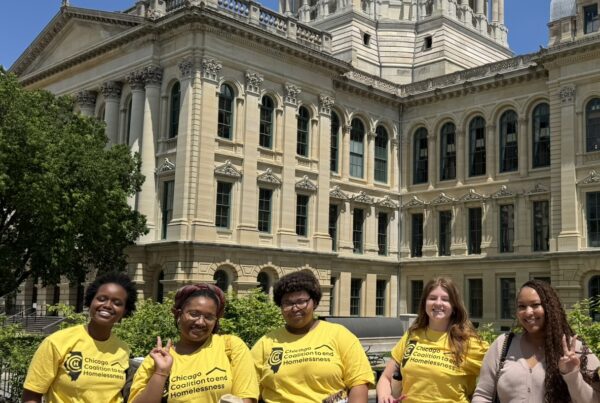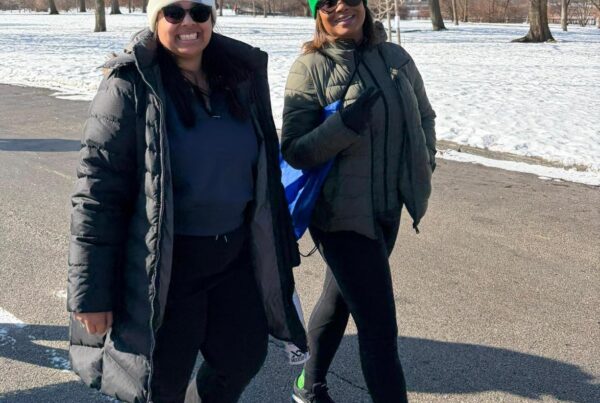 Wayne Richard, a veteran community organizer and a former leader, has been named to serve as the new Director of Organizing at the Chicago Coalition for the Homeless.
Wayne Richard, a veteran community organizer and a former leader, has been named to serve as the new Director of Organizing at the Chicago Coalition for the Homeless.
Wayne is known and respected by CCH allies and those working in the homeless community. A member of the organizing staff for 18 years, he most recently served as Associate Director of Organizing. In that role, he directed organizer training and led Horizons, a creative writing outreach program offered in family shelters.
Wayne succeeds Jim Field, who retired after a 40-year organizing career in Chicago, including 12 years at CCH.
“Wayne has worked hard for years to prepare himself for this new position,” Jim said.
“I could not be happier about Wayne becoming CCH’s new director of organizing,” added Executive Director Doug Schenkelberg. “His many years of experience as an organizer with CCH and his focus on developing our leaders, so their voice can be as powerful as possible, will position CCH to do more to advance our mission.”
Wayne first learned about CCH in 1999, when he was out of work and living at a West Side men’s shelter, Cathedral. He previously experienced homelessness as a young teen, after the death of his grandmother. Though an unaccompanied youth, Wayne graduated from Mendel High School, a now-closed South Side Catholic boys’ school.
Wayne became a leader at CCH through its poetry outreach program, Coming Home. He admits he was reluctant at first, then found himself developing as a poet. As he continued with the program, he went on to publish several pieces and performed his work at poetry slams, WBEZ Public Radio, and WGN-TV.
Within a year, Wayne was asked to do a job interview with the executive director, John “Juancho” Donahue. As it wrapped up, Juancho invited him to join the CCH organizing staff.
“Juancho was a very charismatic guy. He was a man who believed in possibilities for everybody,” Wayne recalled.
Starting his work at CCH on Jan. 2, 2000, Wayne trained under organizing director Ed Shurna. Ed became executive director after Juancho died in 2003, serving through 2015.
“In my first two months, Ed took me around to shelters. People on the street all knew Ed, and they called him out and embraced him. He established himself as someone who was authentically connected to the issue because of the way people received him. It impressed me very much.”
Later, working with Jim Field, the organizing staff developed a strong partnership with CCH’s policy and legal advocates. The organizing department added staff, started a Speakers Bureau, Reentry Project, and State Network, and developed a three-day training offered several times a year to 100 leaders and allies.
With responsibilities to manage organizer training, Wayne said he and Jim “worked a lot on ‘How do you teach organizing?’ How do you bring it to life for people, how do you create a connection in their minds so they understand their power?”
CCH’s poetry program ended in 2002, but Wayne wanted to relaunch a version of it, seeing writing outreach as an effective organizing tool that helps discouraged people to find their voice. Five years later, Wayne revived writing outreach at family shelters, assisted by Mimi Chubb, a writer and Princeton Project 55 staff fellow. Wayne named the program Horizons, “because it means the potential of a new day.”
Horizons involves more than 100 parents and several children each year, with assistance by an Adler Univer sity intern. This year’s Horizons showcase of shelter writers, set for Tuesday, May 22, will be hosted at the American Writers Museum, 180 N. Michigan Ave.
sity intern. This year’s Horizons showcase of shelter writers, set for Tuesday, May 22, will be hosted at the American Writers Museum, 180 N. Michigan Ave.
Wayne’s work as an organizer is focused on the human connection, whether he is running a writing session, mapping strategy with advocates, or mobilizing leaders to go to Springfield.
“When I became involved with CCH, it really started with relationships. I believe relationships are central to organizing. It is the way that we change, appreciate, and understand our world and the people who are in our world and our community.”
Wayne is a member of the Board of Directors at the Ignatian Spirituality Project, where he was a long-time trainer at weekend retreats for homeless men and women. He lives in the South Shore neighborhood with his wife and son.
-Christy Savellano and Anne Bowhay, Media








